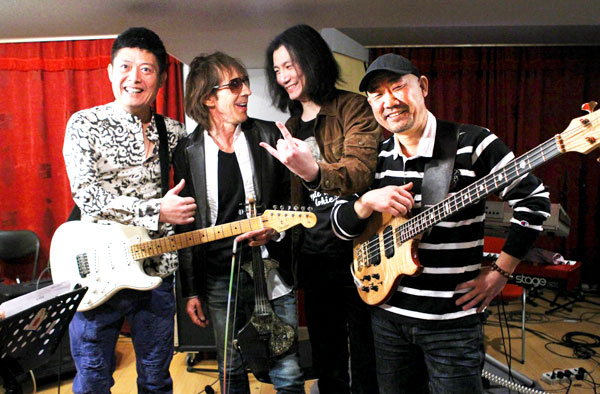Loud again after 7 years
By Chen Nan (China Daily) Updated: 2012-12-21 10:10 |
|
The reunited Black Panther band: (from left) guitarist Li Tong, American guest artist electric violinist Jamii Szmadzinski, keyboardist Hui Peng and bassist Wang Wenjie. |
Rebel band Black Panther is back for a fresh encounter with fans, Chen Nan reports.
Back in 1990, five young men in their early 20s walked on the streets of Beijing sporting tight leather pants and long, wavy hair. They raised a red flag on the Great Wall and jumped about in front of the Forbidden City. The crowds around them looked shocked, though the five were immersed in their own world and didn't seem to care.
Those scenes are in the music video Wu Di Zi Rong, or Shameful, one of the band's hits. Black Panther was then China's first rock 'n' roll band.
The song was on the band's first album, Black Panther, released in 1991 which also included another hit, Don't Break My Heart. The album sold more than 1.5 million copies in China - and is still China's best-selling rock collection ever.
Their second album, Spirit of Light, was released a year later, followed by a rock concert in the Tibet autonomous region. The third album in 1995, No Right No Wrong, sold 500,000 across Asia within a month and the band held a concert in Tokyo as the "first Chinese rock band".
When Li Tong, the guitarist and one of the founding members of the band, recalls their heyday, he seems calm and peaceful.
"We just showed off our confidence and attitude. Our music expressed ourselves," the 48-year-old Beijing native recalls. "We believed we did a great job in music and luckily we got good feedback from fans, who were as young and reckless as we were then."
Those glory days fuelled the young men's passion and desire of success, but all that overwhelming attention also took its toll on the band.
The high expectations were hard to meet, and their fourth and fifth albums sold poorly. Fans were wistful about the first album. Some said the band lost its spirit after legendary frontman Dou Wei left for a solo career in 1992.
That was an obvious and necessary crisis, says Li. "People love our music so much that they placed great hope on us. When we didn't live up to their expectations, they just felt disappointed."
A change in members is definitely devastating for a band, he admits, but the core of a band relies on all rather than a single member.
There were no visible signs of internal quarrelling, no announcement of a breakup or even of a time out, just sudden silence.
Years after the release of the band's last recording in 2005, Black Panther is back with Li, drummer Zhao Mingyi, bassist Wang Wenjie, keyboardist Hui Peng and a new frontman Zhang Dapeng.
The band also returns to a musical landscape that has been changed enormously by economics and technology.
Despite the pressures of the past, Li says the year 2012 is a lucky year because they signed a contract with a new record company and felt it was the right time to make a return.
All the members except for the new lead singer were with the band more than a decade ago. When they reunited, everything went into double-time.
To help get them back in their groove, the band members turned to Phil Nicolo, the Grammy-winning US music producer, and American electric violinist Jamii Szmadzinski.
"Black Panther has a great sense of melody and a sense of real rock routes," says Nicolo, whose rock credits include Billy Joel's Life of Dreams, the Rolling Stones' Love Is Strong, and Aerosmith's Falling in Love.
"I've cooperated with many rock bands and Black Panther threw me back to the old rock energy, which is very exciting," he says.
"People had asked me before how far Chinese rock music is from a Grammy award. And now I can say it's closer," says Nicolo, who is one of the judges of the Grammy awards. He reveals he has been negotiating with some Chinese organizations for a local awards program to be branded by Grammy.
Szmadzinski is in charge of remixing for Black Panther's new album, and the musician, also a violinist, performs in the band's songs.
Comparison is inevitable between the new lead and the old one, but Li is confident about Zhang, who majored in Peking Opera at the Central Academy of Drama.
"Since we're starting from a new point, it's good to bring in new resources into our music and change our classic habits a little," says Li.
The new songs in the album also represent a return to the band's roots.
The songs reflect criticism on social problems and also the individual experiences of band members during the past seven years.
Li is not worried about fans comparing the new album with their old ones. "That period was over, and we have to move on," he says.
Contact the writer at chennan@chinadaily.com.cn.
- It's anchors aweigh in South China Sea
- Global satellite network planned to boost internet
- Progress in judicial protection of rights
- Hangzhou sees boom in tourism after G20 Summit
- Scientists discuss 'air corridor' of south to north water diversion
- China to assist in SE Asian upgrade
- Navy drill highlights strong ties
- Tianjin mayor suspected of corruption, faces probe
- President Xi congratulates opening of Schwarzman College
- In visit to alma mater, Xi calls for equality










